仁爱英语七年级下册Unit 5 英语重点短语句子语法梳理
- 格式:docx
- 大小:49.99 KB
- 文档页数:7
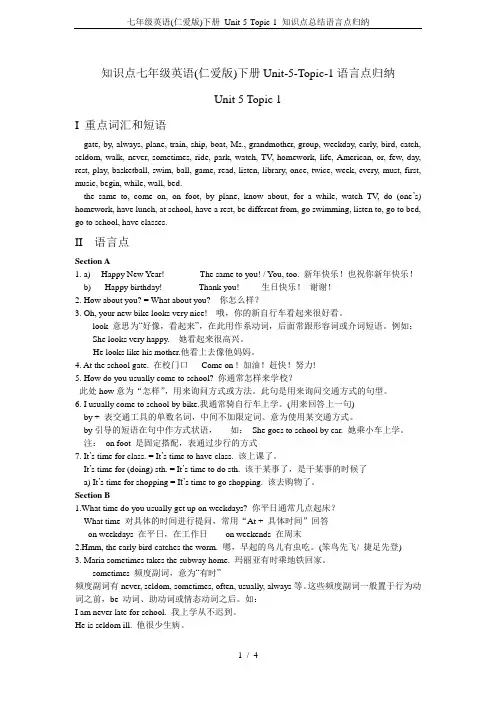
知识点七年级英语(仁爱版)下册Unit-5-Topic-1语言点归纳Unit 5 Topic 1I 重点词汇和短语gate, by, always, plane, train, ship, boat, Ms., grandmother, group, weekday, early, bird, catch, seldom, walk, never, sometimes, ride, park, watch, TV, homework, life, American, or, few, day, rest, play, basketball, swim, ball, game, read, listen, library, once, twice, week, every, must, first, music, begin, while, wall, bed.the same to, come on, on foot, by plane, know about, for a while, watch TV, do (one’s) homework, have lunch, at school, have a rest, be different from, go swimming, listen to, go to bed, go to school, have classes.II 语言点Section A1. a) ---Happy New Year! ---- The same to you! / You, too. 新年快乐!也祝你新年快乐!b) ----Happy birthday! -----Thank you! 生日快乐!谢谢!2. How about you? = What about you? 你怎么样?3. Oh, your new bike looks very nice! 哦,你的新自行车看起来很好看。
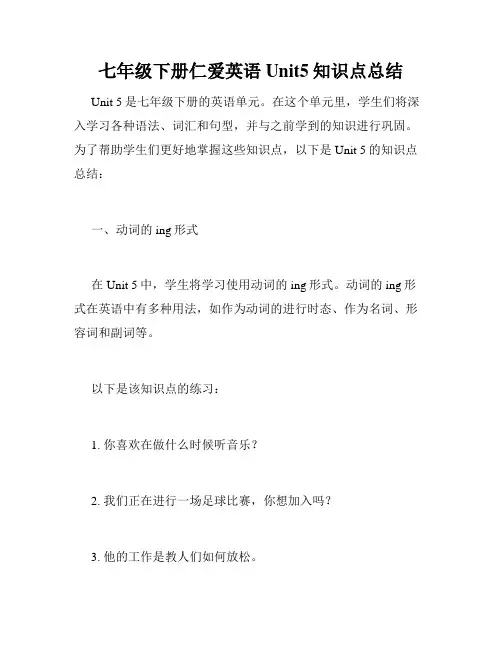
七年级下册仁爱英语Unit5知识点总结Unit 5是七年级下册的英语单元。
在这个单元里,学生们将深入学习各种语法、词汇和句型,并与之前学到的知识进行巩固。
为了帮助学生们更好地掌握这些知识点,以下是Unit 5的知识点总结:一、动词的ing形式在Unit 5中,学生将学习使用动词的ing形式。
动词的ing形式在英语中有多种用法,如作为动词的进行时态、作为名词、形容词和副词等。
以下是该知识点的练习:1. 你喜欢在做什么时候听音乐?2. 我们正在进行一场足球比赛,你想加入吗?3. 他的工作是教人们如何放松。
二、形容词的比较级和最高级形容词的比较级和最高级是英语衡量大小的常见方式。
当比较两个或多个事物的大小、数量或程度时,我们可以使用比较级或最高级。
以下是该知识点的练习:1. 哪个城市比你住的城市更大?2. 你喜欢什么颜色的衣服?3. 她的英语比我好一些。
三、名词单复数在Unit 5中,学生将学习名词的单复数形式。
在英语中,名词单复数的变化规则很多,如在单数名词后加s或es,在某些名词后加ies,或只是在词尾加一个s等。
以下是该知识点的练习:1. 我喜欢吃苹果和橙子。
2. 她有两只小狗。
3. 有些动物从不会变老,比如鲨鱼。
四、祈使句祈使句是一种命令句,用于向他人发出请求、建议或指示。
在祈使句中,动词不需要主语。
以下是该知识点的练习:1. 给我一支笔。
2. 不要在教室里跑步。
3. 拿一个椅子。
五、限定词在英语中,限定词用于在名词前表示数量、身份、归属等信息。
在Unit 5中,学生将学习使用不同的限定词,如冠词、数词、所有格等。
以下是该知识点的练习:1. 我有两本好书。
2. 这是我的学生证。
3. 请把这本书还给我。
总结在Unit 5中,学生将学习使用动词的ing形式、形容词的比较级和最高级、名词单复数、祈使句以及限定词等知识点。
通过充分理解和练习这些知识点,学生将能够更好地运用英语,为未来的学习和生活做好准备。
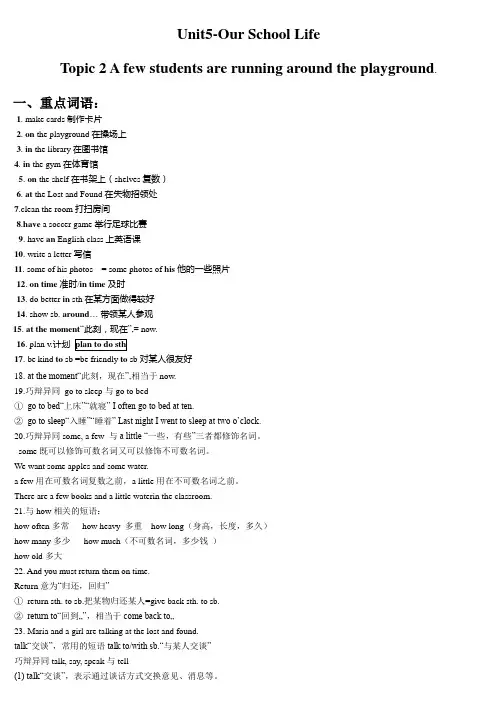
Unit5-Our School LifeTopic 2 A few students are running around the playground.一、重点词语:1. make cards 制作卡片2. on the playground 在操场上3. in the library 在图书馆4. in the gym在体育馆5. on the shelf在书架上(shelves 复数)6. at the Lost and Found 在失物招领处7.clean the room打扫房间8.have a soccer game 举行足球比赛9. have an English class 上英语课10. write a letter 写信11. some of his photos = some photos of his 他的一些照片12. on time准时/in time及时13. do better in sth 在某方面做得较好14. show sb. around…带领某人参观15. at the moment“此刻,现在”,= now.16. plan v.计划17. be kind to sb =be friendly to sb 对某人很友好18. at the moment“此刻,现在”,相当于now.19.巧辩异同go to sleep与go to bed①go to bed“上床”“就寝” I often go to bed at ten.②go to sleep“入睡”“睡着” Last night I went to sleep at two o’clock.20.巧辩异同some, a few 与a little “一些,有些”三者都修饰名词。
some既可以修饰可数名词又可以修饰不可数名词。
We want some apples and some water.a few用在可数名词复数之前,a little用在不可数名词之前。
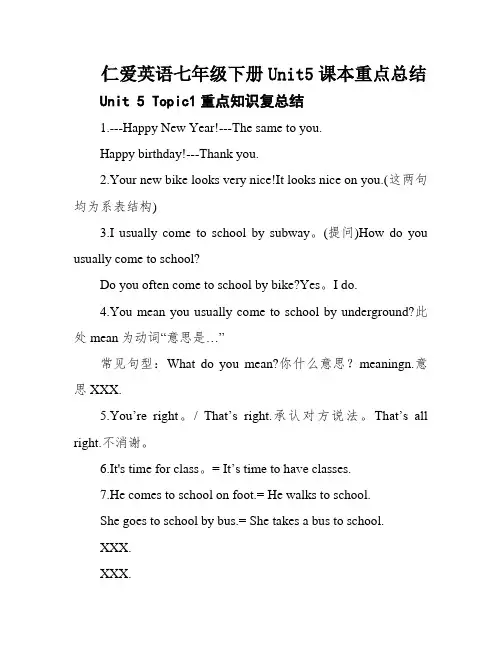
仁爱英语七年级下册Unit5课本重点总结Unit 5 Topic1重点知识复总结1.---Happy New Year!---The same to you.Happy birthday!---Thank you.2.Your new bike looks very nice!It looks nice on you.(这两句均为系表结构)3.I usually come to school by subway。
(提问)How do you usually come to school?Do you often come to school by bike?Yes。
I do.4.You mean you usually come to school by underground?此处mean为动词“意思是…”常见句型:What do you mean?你什么意思?meaningn.意思XXX.5.You’re right。
/ That’s right.承认对方说法。
That’s all right.不消谢。
6.It's time for class。
= It’s time to have classes.7.He comes to school on foot.= He walks to school.She goes to school by bus.= She takes a bus to school.XXX.XXX.8.Kankang meets Jane at the school gate.XXX foot步行(此类均为介词短语)10.I usually get up at about six o’clock on weekdays。
(提问)What time do you usually get up on weekdays?11.The early bird catches the worm.12.XXX XXX to school.He sometimes takes the train to Xinxiang.He often comes on foot.Sally usually takes a plane to the USA.Lucy always takes a bus to Xinxiang.13.Classes begin at eight。
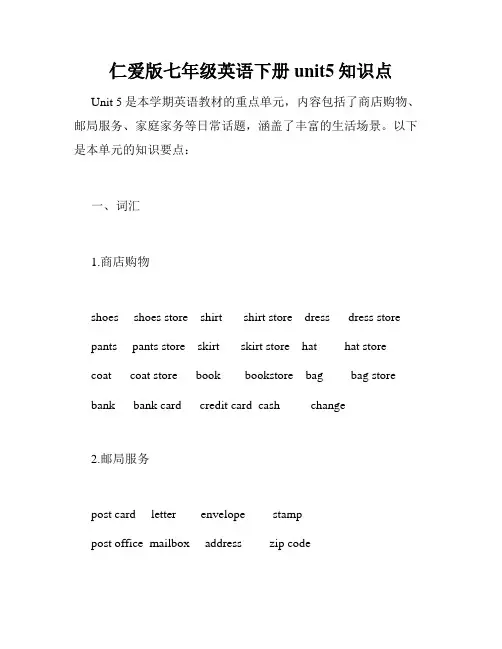
仁爱版七年级英语下册unit5知识点Unit 5是本学期英语教材的重点单元,内容包括了商店购物、邮局服务、家庭家务等日常话题,涵盖了丰富的生活场景。
以下是本单元的知识要点:一、词汇1.商店购物shoes shoes store shirt shirt store dress dress storepants pants store skirt skirt store hat hat storecoat coat store book bookstore bag bag storebank bank card credit card cash change2.邮局服务post card letter envelope stamppost office mailbox address zip code3.家庭家务clean clean up sweep mopwash laundry fold drydish do the dishes set the table clear the table二、重点语法本单元的语法重点是一般现在时和there be句型的运用。
1.一般现在时一般现在时通常用来表示反复发生的动作、习惯性的行为或者现在的状态。
它的构成方式是主语+动词原形+其他。
注意第三人称单数形式应该在动词后面加上“s”。
例如:I often go shopping on weekends. (我经常在周末去购物。
)She always buys books in the bookstore. (她总是在书店买书。
)2.there be句型there be句型用来表示某地或某处有某物。
当表示单数或者不可数名词时,应该用there is;当表示复数名词时,应该用there are。
例如:There is a bank in front of the bookstore. (书店前面有一家银行。
)There are some chairs in the classroom. (教室里有一些椅子。
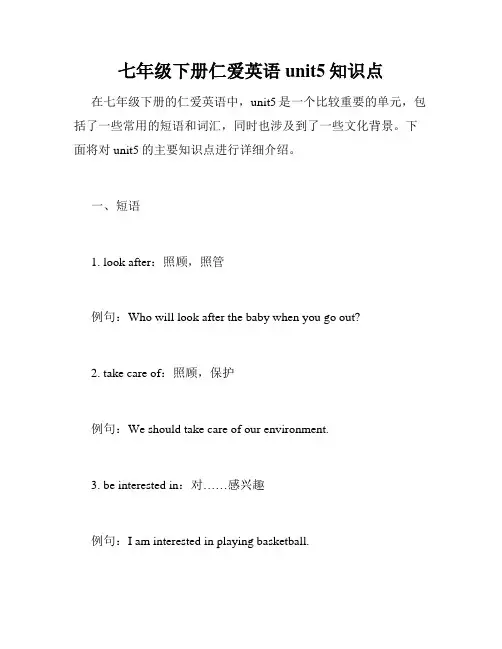
七年级下册仁爱英语unit5知识点在七年级下册的仁爱英语中,unit5是一个比较重要的单元,包括了一些常用的短语和词汇,同时也涉及到了一些文化背景。
下面将对unit5的主要知识点进行详细介绍。
一、短语1. look after:照顾,照管例句:Who will look after the baby when you go out?2. take care of:照顾,保护例句:We should take care of our environment.3. be interested in:对……感兴趣例句:I am interested in playing basketball.4. be good at:擅长于例句:Tom is good at playing the guitar.5. be fond of:喜欢例句:She is fond of reading books.6. give up:放弃例句:Don’t give up easily when you meet difficulties.7. keep on:继续例句:Please keep on practicing your speaking.8. be responsible for:对……负责例句:He is responsible for his actions.二、词汇1. instrument:乐器例句:Learning instruments can enrich our life.2. audience:观众例句:The audience applauded when the performance ended.3. skill:技能例句:We need to develop our skills to be successful in the future.4. traditional:传统的例句:Chinese New Year is a traditional festival in China.5. modern:现代的例句:We are living in a modern society with advanced technology.6. entertainment:娱乐例句:People need some entertainment to relax themselves.7. opportunity:机会,时机例句:The concert provides a good opportunity for music lovers. 8. successful:成功的例句:As long as we work hard, we will be successful in the end.三、文化背景在unit5中,我们学习了一些西方乐器和音乐文化。
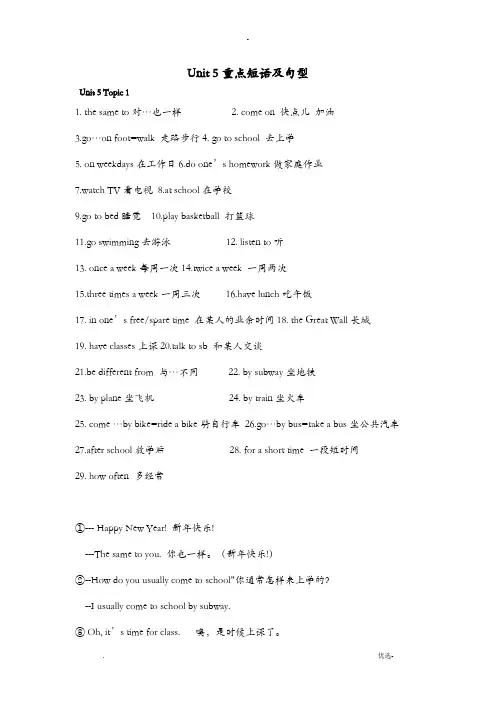
Unit 5重点短语及句型Unit 5 Topic 11. the same to对…也一样2. come on 快点儿加油3.go…on foot=walk 走路步行4. go to school 去上学5. on weekdays在工作日6.do one’s homework做家庭作业7.watch TV看电视8.at school在学校9.go to bed睡觉10.play basketball 打篮球11.go swimming去游泳12. listen to听13. once a week每周一次14.twice a week 一周两次15.three times a week一周三次16.have lunch吃午饭17. in one’s free/spare time 在某人的业余时间18. the Great Wall长城19. have classes上课20.talk to sb 和某人交谈21.be different from 与…不同22. by subway坐地铁23. by plane坐飞机24. by train坐火车25. come …by bike=ride a bike骑自行车26.go…by bus=take a bus坐公共汽车27.after school放学后28. for a short time 一段短时间29. how often 多经常①--- Happy New Year! 新年快乐!---The same to you. 你也一样。
(新年快乐!)②--How do you usually come to school"你通常怎样来上学的?--I usually come to school by subway.③ Oh, it’s time for class. 噢,是时候上课了。
④--How do you usually come to school"你通常怎样来上学的?回答可以用go/come...by+交通工具来回答。
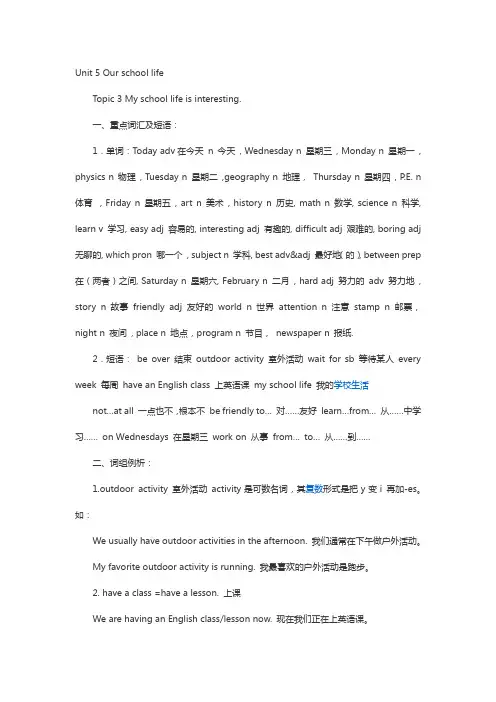
Unit 5 Our school lifeTopic 3 My school life is interesting.一、重点词汇及短语:1.单词:Today adv在今天n 今天, Wednesday n 星期三, Monday n 星期一, physics n 物理, Tuesday n 星期二,geography n 地理,Thursday n 星期四, P.E. n 体育,Friday n 星期五, art n 美术, history n 历史, math n 数学, science n 科学, learn v 学习, easy adj 容易的, interesting adj 有趣的, difficult adj 艰难的, boring adj 无聊的, which pron 哪一个, subject n 学科, best adv&adj 最好地(的), between prep 在(两者)之间, Saturday n 星期六, February n 二月, hard adj 努力的adv 努力地, story n 故事friendly adj 友好的world n 世界attention n 注意stamp n 邮票,night n 夜间, place n 地点,program n 节目,newspaper n 报纸.2.短语:be over 结束outdoor activity 室外活动wait for sb 等待某人every week 每周have an English class 上英语课my school life 我的学校生活not…at all 一点也不,根本不be friendly to…对……友好learn…from…从……中学习……on Wednesdays 在星期三work on 从事from…to…从……到……二、词组例析:1.outdoor activity 室外活动activity是可数名词,其复数形式是把y变i 再加-es。
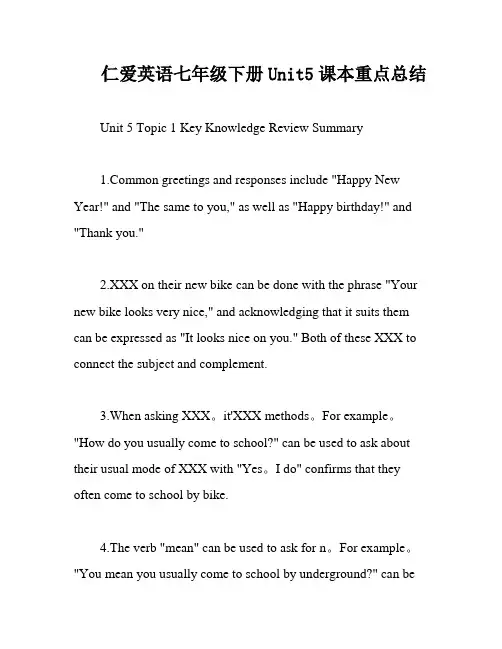
仁爱英语七年级下册Unit5课本重点总结Unit 5 Topic 1 Key Knowledge Review Summarymon greetings and responses include "Happy New Year!" and "The same to you," as well as "Happy birthday!" and "Thank you."2.XXX on their new bike can be done with the phrase "Your new bike looks very nice," and acknowledging that it suits them can be expressed as "It looks nice on you." Both of these XXX to connect the subject and complement.3.When asking XXX。
it'XXX methods。
For example。
"How do you usually come to school?" can be used to ask about their usual mode of XXX with "Yes。
I do" confirms that they often come to school by bike.4.The verb "mean" can be used to ask for n。
For example。
"You mean you usually come to school by underground?" can beused to XXX。
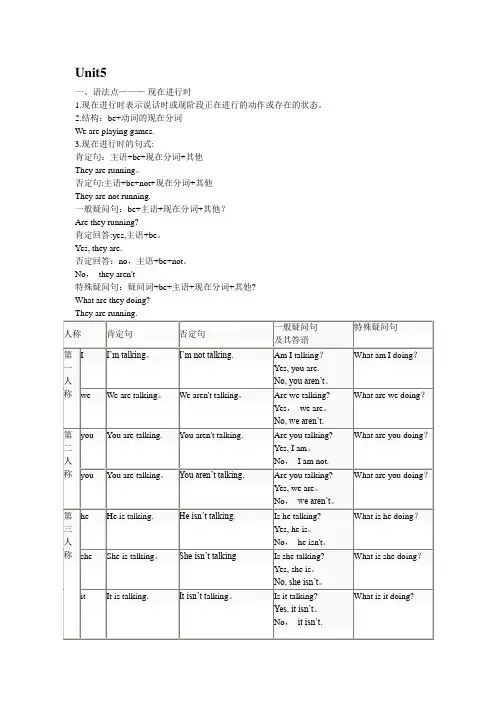
Unit5一、语法点———-现在进行时1.现在进行时表示说话时或现阶段正在进行的动作或存在的状态。
2.结构:be+动词的现在分词We are playing games.3.现在进行时的句式:肯定句:主语+be+现在分词+其他They are running。
否定句:主语+be+not+现在分词+其他They are not running.一般疑问句:be+主语+现在分词+其他?Are they running?肯定回答:yes,主语+be。
Yes, they are.否定回答:no,主语+be+not。
No,they aren't特殊疑问句:疑问词+be+主语+现在分词+其他?What are they doing?4.动词现在分词构成:&&正常变化是在动词原型后加ing 如:read—-—-reading ;drink-—-drinking ;eat—-—eating ;&&以e结尾的动词,去掉e再加ing 如:write -——writing ;make-—— making ; ride---riding ;&&重读闭音节( 只有一个元音字母,而其后跟有一个辅音字母时)要双写结尾的辅音字母再加ingsit--—sitting ; swim-—swimming ; put-—-putting ; run—running&&以ie结尾的动词—ie+y+ing:lie -- lying die --— dying&&以y结尾的动词变成现在分词是,y不变,直接加上-ing总结一添一去y不变5.标志词:可用来表示现在进行时的时间状语,常用的有:now, this week, at this moment 等;或者告诉你一个准确的现在时间,或者用look, listen提醒听者注意正在发生的事。
e.g.: They are playing basketball now。
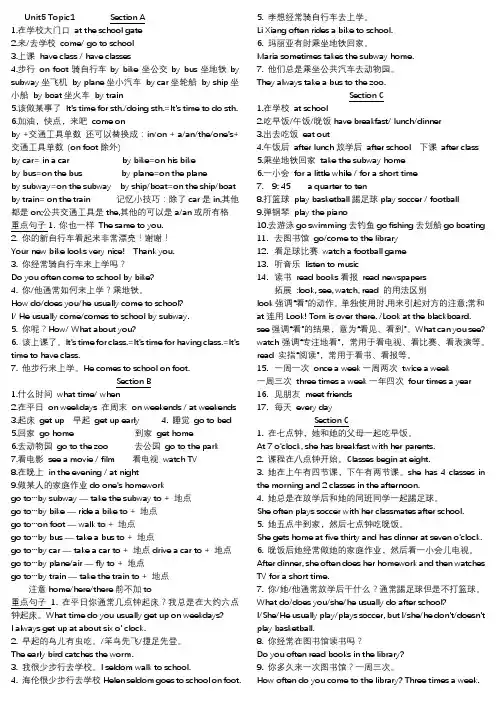
Unit5 Topic1Section A1.在学校大门口at the school gate2.来/去学校come/ go to school3.上课have class / have classes4.步行on foot骑自行车by bike坐公交by bus坐地铁by subway坐飞机by plane坐小汽车by car坐轮船by ship坐小船by boat坐火车by train5.该做某事了It’s time for sth./doing sth.=It’s time to do sth.6.加油,快点,来吧come onby +交通工具单数还可以替换成:in/on + a/an/the/one’s+交通工具单数(on foot除外)by car= in a car by bike=on his bikeby bus=on the bus by plane=on the planeby subway=on the subway by ship/boat=on the ship/boat by train= on the train 记忆小技巧:除了car是in,其他都是on;公共交通工具是the,其他的可以是a/an或所有格重点句子1. 你也一样The same to you.2. 你的新自行车看起来非常漂亮!谢谢!Your new bike looks very nice! Thank you.3. 你经常骑自行车来上学吗?Do you often come to school by bike?4. 你/他通常如何来上学?乘地铁。
How do/does you/he usually come to school?I/ He usually come/comes to school by subway.5. 你呢?How/ What about you?6. 该上课了。
It’s time for class.=It’s time for having class.=It’s time to have class.7. 他步行来上学。
2020仁爱版初中英语七年级下册知识点、重点句型、单词归纳七年级1Unit 5 Topic 1重点短语:1. on foot 步行go …on foot = walk ( to )…2. at the school gate在学校大门口3. on weekdays在平日 ,在工作日4. on weekends=on the weekend在周末5. after school 放学后6. after class 下课后7. after breakfast / lunch / supper早餐 / 午餐 / 晚餐后8. in one's free time在某人空闲时间9. have a rest 休息一下 10. read books 读书 11. go swimming 去游泳 12. listen to music 听音乐 13. watch TV 看电视 14. do(one’s) homework 做作业 15. go to the zoo / park去动物园 / 公园16. once a week 一周一次 17. every day 每天 18. have classes 上课 19. for a little while 一会儿 20. go to bed 上床睡觉 21. come on 快点,加油,来吧 22. get up 起床 23. talk with / to sb.与某人谈话 24. at school 在学校、在上课 25. go to school 去上学 26. and so on ……等等重点句型:1. --Happy New Year! --The same to you.2. --Your new bike looks very nice. --Thank you.3. --How do you usually come to school? --I usually come to school by subway.4. --How often do you go to the library? --Once/Twice/Three times a week/Very often/Every day/Sedom6. The early bird catches the worm.(谚语) 笨鸟先飞7. Work / Study must come first.工作/ 学习必须放在第一位!8. Classes begin at eight.=Class begins at eight.9. What time does the class begin?What time do the classes begin?10. We have no more time.我们没有更多的时间了。
Unit 5 Topic1㈠短语总结1.在学校大门口at the school gate2.来学校come to school3.去学校go to school4.上课have class / have classes5.步行on foot6.骑自行车ride a bike/ ride bikes/ by bike / on a bike7.坐公交by bus / take a bus8.坐地铁by subway / take the subway / on the subway9.坐飞机by plane/ take the plane / on the plane10.坐小汽车by car / in a car/ take a car/ drive a car11.坐轮船by ship12.坐小船by boat13.坐火车by train / on the train14.在我们组in our group15.一群学生a group of students16.我们中的三个人three of us17.在平日on weekdays18.在周末on the weekends / at weekends19.起床get up20.睡觉go to bed21.早起get up early22.回家go home23.到家get home24.去动物园go to the zoo25.去公园go to the park26.看电影see a movie / film27.看电视watch TV28.在晚上in the evening / at night29.帮助父母help parents30.做某人的家庭作业do one’s homework31.在学校at school32.知道,了解know about / learn about33.校园生活school life34.一个美国学生an American student35.在美国in America / in the U.S.A.36.许多学生many students/ a lot of students/lots of students37.很少seldom38.吃午饭have lunch39.出去吃饭eat out40.在校期间on school days41.休息一会have a short rest/ break42.午饭后after lunch43.在某人的业余时间in one’s ( my/ his/ her/their…)free/ spare time44.打篮球play basketball45.踢足球play soccer / football46.弹钢琴play the piano47.弹吉他play the guitar48.拉二胡play erhu49.去游泳go swimming / go for a swim50.去划船go boating51.球赛a ball game / ball games52.一年四次four times a year53.听音乐listen to music 54.读书read books55.看报read newspapers56.看医生see a doctor57.去图书馆go to the library58.一周两次twice a week59.见朋友meet friends60.每天every day61.在七点半at half past seven62.一小会for a little while / for a short time63.晚饭后after supper64.吃饭have dinner65.吃早饭have breakfastUnit5 Topic2(二)短语总结:1. on time 准时2. in time 及时3 .in the center of: 在…..中央4 .next to 在什么隔壁,在什么旁边5. at the back of ; 在….后面(外部后面)6. in front of….在…..前面(外部后面)7. behind 在…..后面(内部后面)8. in the front of 在….前面(内部后面)9 .on the left 在左边10. on the right 在右边11. Show sb around 领某人参观12. between …and… 在….与….之间13. from ….to…从…..到…..14. On the shelf 在架子上shelf复数形式是shelves15. do better in sth/doing sth 在……方面做的更好do well in sth/doing sth 在…..做得好be good at sth/doing sth 在…..方面擅长16. at the moment 现在,此刻17. play computer games 玩电脑游戏18. a few 几个19. the Great Wall 长城Unit 5 Topic 3(二)重点短语1.Have a music class.上音乐课2.at ten o’clock 在十点钟3.be over (=finish) 结束4.on+星期名词在星期几5.outdoor activities 户外活动6.work on 致力于,专心于7. learn about the past 了解历史8.it’s time for … 该干…了9.be friendly to 对…友好10. play with sb 和某人玩耍Play with sth玩弄某物11.swim in the swimming pool 在游泳池游泳12.draw pictures 画画14. every Tuesday and Thursday 每周二和周四15.tell sb sth=tell sth to sb 把某事告诉某人16. school newspaper 校报17.and so on 等等18. learn sth from 从…学到…19. hard work 辛勤工作20. thank sb for sth/ thank sb. for doing sth因某事而感谢某人21. run on the playground 在操场跑步 22. watch animals 看动物23. play soccer at school 在学校踢足球 24. read a book at home 在家看书25.have dinner in the school dinning hall 在学校餐厅吃饭Unit 6 Topic 1 (一)重点短语: 在第二层 building has four floors. I am on the first floor.) 2. go upstairs ( adv.)上楼; go downstairs 下楼 3. a moment later 过了一会儿 4. play with sb 和某人一起玩 play with sth. 玩弄某物 5. in front of 和in the front of 区别:加the 的词组表示物体内部的前面 6. on the wall 在墙上 in the wall 7. on the tree (苹果) in the tree (鸟) 8. a model plane 模型飞机 9. play on the computer 玩电脑 (比较play computer games 玩电脑游戏) Unit 6 Topic 2 (一)重点短语 1. 在农村 in the country 在郊区 in the suburb2.一套三居室的房子3.. call sb. at +电话号码 ,4.a quiet double room under 300yuan per month 300元5.house with furniture for a family of three 适合三口之家,家具齐全的房子6.rent sth. to sb. 把某物租给某人 rent sth. from sb. 从某人那租某物 8.on the street corner 在街角 9. keep money 存钱 10.寄信 mail (post) letter 11.see a doctor 看医生 12.month 的复数 months munity service center in our area 15.靠近 be close (adj.) to / close (adv.) to / near / next to (紧靠) 【反义词是 far from 】 16. right now 马上,立刻= at once 17.Children’s Day 儿童节 ; 18.Teachers’ Day 教师节 ; 19.Women’s Day 妇女节Uint 6 Topic 3 1. = take the second street(turning) on the left 2. go across (prep.) the bridge = cross (v.)the bridge 过桥 3. across from 在….的对面 4. on the road 在路上 on/ in the street 在街上 5. on the corner of the street 在街角(比较in the corner of 和at the corner of ) 6. bet ween….and ….在…和….之间 7. walk on 继续走8 public phone 公用电话9. at the traffic lights 在红绿灯处 10. No right turn 禁止右转 No parking 禁止停车Go straight 直走11. be in danger 处于危险之中 12. get hurt 受伤(get 系动词,hurt 是形容词) 13. lose one’s life 失去了某人的生命 14. obey the traffic rules 遵守交通规则 15. a ticket for speeding/ drinking and driving/parking in the wrong place/ making a wrong turn 超速/酒后驾车/乱停车/转错弯罚单 16. make a wrong turn 转错弯 17. keep quiet in class. 上课时要安静。
Unit5 Our school lifetopic1 How do you ususally come to school一.重点句型1.Happy New Year! The same to you.2.Your new bike looks very nice. Thank you.3.How do you usually come to school? —I usually come to school by subway.4.How often do you go to the library?5.—Once/Twice/Three times a week/Very often/Every day/Sedom6.The early bird catches the worm. (谚语) 笨鸟先飞7.Work / Study must come first. 工作/ 学习必须放在第一位!8.Classes begin at eight. =Class begins at eight.9.What time does the class begin? / What time do the classes begin?10.We have no more time. 我们没有更多的时间了。
11.I have four classes in the morning and two in the afternoon.我早上上四节课,下午上两节。
12.She goes to bed at about a quarter to ten. 她九点四十五分睡觉。
二.重点短语1.on foot go …on foot = walk ( to )…2.at the school gate在学校大门口3.on weekdays 在平日 ,在工作日4. on weekends=on the weekend在周末5.after school 放学后6.after class 下课后7.after breakfast / lunch / supper早餐/ 午餐/ 晚餐后8.in one’s free time在某人空闲时间9.have a rest 休息一下10.read books 读书11.go swimming 去游泳12.listen to music 听音乐13.watch TV 看电视14.do(one’s)homework 做作业15.go to the zoo / park 去动物园/ 公园16.once a week 一周一次17.every day 每天18.have classes 上课19.for a short time一会儿20.go to bed 上床睡觉e on 快点,加油,来吧22.get up 起床23.talk with / to sb.与某人谈话24.at school 在学校、在上课25.go to school 去上学26.and so on ……等等三.重点详解1.by+交通工具,表示使用某种交通方式,中间不加限定词,如果交通工具前有a, the, my 等限定词,就不能用by,而是用in或是on. by +动词ing形式,表示通过某种方式乘坐交通工具:by +交通工具(by car/bus/train/ship)t ake the+交通工具(take the bus/car)on+大型封闭式工具(on the bus/ train/ship/plane)on the train=by train on his bike=by bike on a bike/motorbikein +小型封闭交通工具(in a car/taxi)in my car=by carI always come to school by bus.(表交通工具)People show love to their mothers by giving cards.(表方式)You can be a good student by working hard.(表方式)He often go back home____________/_____________ (bus) (使用两种表达方式)Jane always comes to China____________/_____________ (plane) (使用两种表达方式)I don’t want to go there ____________/_____________ (bike) (使用两种表达方式)巧辩异同on foot 与walk on foot “走路”,是介词短语,不能作谓语,只作方式状语,位于句末。
Unit 5 Topic 3 知识点一、重点短语be over结束have a (an) music class 上音乐课help each other互相帮助learn about the past了解过去work out math problems 解决数学问题be kind to sb.对某人很和蔼between …and 在两者之间different kinds of stamps不同种类的邮票learn…from 从…中学到二、重点句型1. 今天星期几??2.?3.他们现在正在上什么课??他们正在上一节英语课。
.4.几点下课??5.------你最喜欢哪个学科??------我最喜欢历史。
.------你为什么喜欢它??------因为它很容易很有趣。
.6.------你认为英语怎么样??>------它有点难。
.7.该上课了。
.8.你能告诉我一些关于你的学校生活吗?your school life?9.你们每周有几节英语课?every week?10.谢谢你的努力工作。
.三、语法:现在进行时和一般现在时—现在进行时:表示现在正在进行或发生的动作(谓语结构:be + V-ing)一般现在时:表示主语的性质或特点;表示经常习惯性动作;用来描述客观事实(谓语结构:1. be (am, is, are) 2.实义动词原形或三单形式)1.I (read) a book now.2.Listen! The girl (sing).3.My father (work) in the hospital.4.How many lessons he (have) on Monday ?5.--------What they (now)?—-------They (play) basketball on the playground.6.He (get) up at six o’clock in the morning.7.She (not have) sisters or brothers.8.It’s seven o’clock. Mr. Greens (have) breakfast.I.单项选择。
仁爱版七年级下册U n i t5_T o p i c1_知识点归纳work Information Technology Company.2020YEARUnit 5 Our School LifeTopic 1 How do you usually come to school?一、重点短语:Come on on foot take a bus by bus after school a short time listen toWatch TV know about be over in one’s free time on weekdays go to bed二、重点句型:1. I never come to school by subway.2. Maria sometimes takes the subway home.3. We usually go to the park on foot.4. I seldom walk to school.5. Li Xiang often rides a bike to school.6. They always go to the zoo by bus.7. --Happy New Year! --Happy New Year!/ The same to you.8. The early bird catches the worm.9. She goes to bed at about a quarter to ten.10. --How often do you come to the library--Three times a week./ Very often./三、重点知识点1. The same to you也祝你……。
用于别人向你祝福时对对方的回应,相当于You, too!e.g.-- Have a nice weekend!周末愉快! -- The same to you!也祝你愉快!2. look在此为系动词,表示“看起来……,看上去……”,后面接形容词。
Unit 5 Our School Lifetopic1 How do you go to school?一、重点词语:1. wake up 醒来,唤醒get up 起床2. go to school 去上学go home 回家3. go dancing / shopping / skating / swimming 去跳舞;购物、滑冰;游泳go doing something 可用于表达去进行某种娱乐休闲活动。
4. 表示交通方式:on foot 步行by boat 坐船by ship 坐船by air 乘飞机by plane 乘飞机by train 坐火车by subway 搭乘地铁by car 坐小汽车by bus 坐公共汽车by bike 骑自行车5. take the subway / bus / car 搭乘地铁;公共汽车;小汽车6. drive a car to work = go to work by car 驾车去上班take a bus to work = go to work by bus 乘公共汽车去上班go to school on foot = walk to school 步行去上学7. ride a bike / horse 骑自行车;骑马8. after school / class 放学以后;下课以后9. play the piano / guitar / violin 弹钢琴;吉他;小提琴play basketball / soccer / football 打篮球;踢足球;打橄榄球play computer games 玩电脑游戏play with a computer 玩电脑play sports 做运动10. next to 紧挨着,在…旁边11. a plan of my school 一幅我们学校的平面图12. on weekdays 在工作日at weekends 在周末13. have breakfast / lunch / supper / dinner / meals吃早餐;中餐;晚餐;正餐;一日三餐have classes / lessons / a meeting 上课;上课;开会14. watch TV / movies / games / the animals 看电视;电影;比赛;动物read novels / newspapers / books 看小说;报纸;书15. wash one’s face / clothes 洗脸;衣服16. 反义词:up – down, early – late 近义词:quickly – fastget up early 早起be late for 迟到17. the first / second / third / fourth day 第一;二;三;四天18. clean the house 打扫房子19. 表示建筑物(尤其学校建筑物):on the playground 在操场at school / home / table 在学校;家里;桌旁in a computer room / teachers’ office / classroom building / gym / library / lab / canteen 在电脑室;教师办公室;教学楼;体操馆;图书馆;实验室;食堂20. around six o’clock = at about six o’clock 大约在六点21. 频率副词:never, seldom, sometimes, often, usually, always二、重点句型:1. It’s time to get up. 该起床的时候了。
七年级下册Unit 5 英语重点短语句子语法梳理Unit 5 Topic 1重点短语:1. on foot = walk ( to )…步行2. at the school gate在学校大门口3. on weekdays在平日 ,在工作日4. on weekends在周末5. after school 放学后6. after class 下课后7. after breakfast / lunch / supper早餐 / 午餐/ 晚餐后8. in one's free time在某人空闲时间9. have a rest 休息一下10.g o fishing 读去钓鱼11.go swimming 去游泳12.listen to music 听音乐13.watch TV 看电视14.do(one’s)homework 做作业15.go to the zoo / park去动物园 / 公园16.once/twice a week 一周一次/两次17.every day 每天18.have classes 上课19.for a short time 一会儿20.go to bed 上床睡觉21.get up 起床e on 快点,加油,来吧23.talk with / to sb.与某人谈话24.at school 在学校、在上课25.a t home 在家26. and so on ……等等重点句型:1. --Happy New Year! --The same to you.2.--Your new bike looks very nice. --Thank you3.--How do you usually come to school? --I usually come to school by subway.4.--How often do you go to the library?--Once/Twice/Three times a week/Very often/Every day/Seldom5. The early bird catches the worm.(谚语) 笨鸟先飞6.--What time do you usually get up? --At 6:307. What time does the class begin?8.What time is the class over?9. It’s time for class.=It’s time to have a class.10. I have four classes in the morning and two in the afternoon.11. She goes to bed at about a quarter to ten.她九点四十五分睡觉。
We often have lunch at school.我们经常在学校吃午饭。
重点语法:一般现在时一般现在时(常与频度副词never, seldom, sometimes, often,usually等连用)一般现在时表示:(1)现在所处的状态。
Jane is at school.(2)经常或习惯性的动作。
I often go to school by bus.(3)主语具备的性格和能力。
He likes playing football.(4)客观真理。
The earth goes round the sun.常用的时间状语:often, always, usually, sometimes, every day等等。
行为动词的一般现在时,助动词是do/don’t和does/doesn’t.当主语是第一、二人称和所有复数形式时,行为动词用原形。
肯定式:I go to school on foot.否定式:I don’t go to school on foot.疑问式:Do you go to school on foot? —Yes, I do. —No, I don’t.当主语是第三人称单数时,动词用第三人称单数形式,在词尾加-s或-es。
肯定式:He goes to work by bus.否定式:He doesn’t go to work by bus.疑问式:Does he go to work by bus? —Yes, he does. —No, he doesn’t. Unit 5 Topic 2重点短语:1. make cards 制作卡片2. on the playground 在操场上3. in the library 在图书馆4. in the gym在体育馆5. on the shelf在书架上(shelves 复数)6.clean the room打扫房间7.have a soccer game 举行足球比赛8. have an English class 上英语课9. write a letter 写信10.draw pictures 画画11.on time 准时/ in time及时12.show sb. around…带领某人参观……13.look for 寻找14.a t the moment“此刻,现在”= now.15.be kind to sb =be friendly to sb 对某人很友好学科名词:一周名词:重点句型:1. --What are you doing? -- I am making cards.2.-- Are you doing your homework?--Yes, I am./No, I am not.3.--My I borrow your workbook?--Of course. Here you are.4.--How long can I keep them? --Two weeks.5.You must return them on time.6.--Thank you. --It’s a pleasure/You are welcome. 别客气。
--Sorry, I don’t have any. --Thank you all the same. 仍然感谢你。
重点语法:现在进行时基本结构:肯定式:am/is/are+doing(现在分词)否定式:am/is/are not +doing(现在分词)一般疑问式:Am/Is/Are + 主语+doing(现在分词)+ 其他特殊疑问式:特殊疑问词+一般疑问式They’re having a meeting now.他们现在正在开会。
They aren't having a meeting now. 他们现在没有在开会。
Are they having a meeting now? 他们现在正在开会吗?What are they doing now? 他们现在正在做什么?基本用法:1. 表示此时此刻正在发生的事情。
常与now,at the moment,look,listen 等词连用。
The little boy is watching TV now. 这个小男孩现在正在看电视。
Listen!She is playing the guitar in the next room. 听!她正在隔壁房间弹吉他。
2. 表示现阶段一直在进行着或是重复发生着的动作,不强调此时此刻正在做。
常与表示时间段的时间状语连用。
I am studying computer this term. 这个学期我一直在学习计算机。
现在分词(doing)的变化规则:1. 一般在情况下,在动词词尾加-ing。
go——goingplay——playingknow——knowing2. 以不发音的字母e结尾动词,先去e再加-ing。
make——makingarrive——arrivingcome——comingUnit 5 Topic3重点短语:1. outdoor activity 课外活动2. easy and interesting 容易又有趣3. difficult and boring 又难又乏味4. be friendly to sb. =be kind to sb. 对某人友好5.between…and… 在……之间…6.from…to… 从……到……7.learn…from… 向…学习…/从…中学…8. learn about了解9. How long多长时间10.H ow often多经常/多久一次11.in the morning / afternoon / evening 在早上/ 下午/ 晚上12.on Monday/Sunday 在星期一 /星期天13.h ave an English class上英语课have three classes上三节课14.tell sb. about sth告诉某人关于某事重点句型:1. --What day is it today?--It’s Sunday. (在英语国家每周的第一天是星期天而不是星期一) 2.--What class are they having?--They are having a music class.3.--What time does the class begin?--At ten o’clock.4.--What do you think of math? / How do you like math ?你认为数学怎么样?--It’s difficult and boring.5.--Why (为什么)do you like English ?--Because(因为)it’s easy and interesting.6. --What subject (学科)do you like best ?--I like history best.7. --Why (为什么)do you like English ?--Because(因为)it’s easy and interesting.8.--How many lessons does he have every weekday?--Seven lessons9.At school, my teachers and classmates are very kind to me.10. I study Chinese, English, politics, geography and some other subjects.11. I also like P.E and music. I like P.E and music , too. (也)重点语法:一般现在时和现在进行时及它们之间的区别Ⅰ概念不同一般现在时表示经常的、习惯性的动作或存在的状态;也表示说话者的态度、能力或自然现象等等。